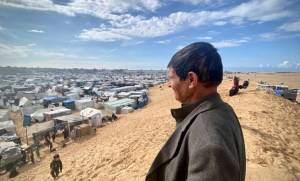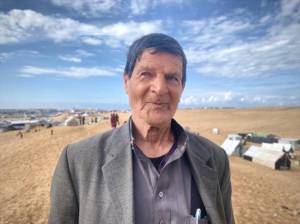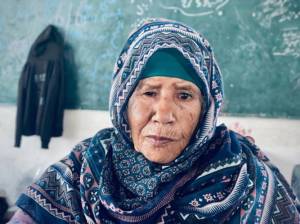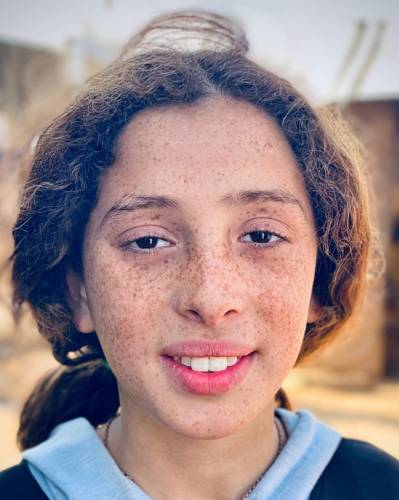Human Wrongs Watch
Young and old alike continue to survive amid the unspeakable violence of nearly nine months of war.
Abu Kefah Qadih, is an 81-year-old Palestine Refugee from Khan Younis. He has weathered forced displacement not once, but twice in his lifetime. As a child, he endured the horror of the Nakba – the mass displacement and dispossession of Palestinians during the 1948 Arab-Israeli war. Now he has been forced to witness the dispossession of his own grandchildren.
Together they are currently living through the same ordeal he knew too well as a child.
This heart-wrenching reality leaves the elderly man profoundly shaken, shattering any hope he may have held that his family could be spared such a cruel fate.
“The scenes I witnessed as a child are being repeated with my own grandchildren,” he laments, his voice trembling with raw emotion.
“Watching helplessly as people flee from death, forced to live in tattered tents, clinging to the desperate hope of one day returning home – it shatters my heart to witness this horrific cycle unfolding all over again, this time impacting my own family,” Abu Kefah says.
.
.
His aged eyes reflect the weariness of a lifetime burdened by unrelenting displacement and loss.
“Many have been killed, their homes reduced to rubble, but still we remain steadfast, accepting God’s will,” he affirms as a tear escapes from his eye, a potent testament of the profound sorrow etched into his weathered face.
.
.
Hajjeh Zainab, 88, is another al Nakba survivor from Beersheba. Her family fled the once peaceful grazing land they called home for the Maghazi area of southern Wadi Gaza in 1948.
Before the Nakba, her family cultivated the land and lived off the livestock they raised, such as sheep, goats, and camels.
Hajjeh Zainab recalls, “We used to honor guests and welcome them into our homes and on our lands from which we were forced to flee…
… We always used to say, ‘May God grant us a guest before the sun sets,’ such was our love for honoring guests. These are the traditions of the Bedouins in the tribes of Beersheba, and we, the good people of this land, lived a simple life filled with love, harmony, and happiness,” she says.
“But in one night and one day, gangs attacked us, killed us, slaughtered our children, families, and men, and forced us to leave our homes under the threat of fire, killing, and massacres,” she laments.
Now she is enduring renewed displacements.
“We were displaced from our homes in the Maghazi area to schools in Nuseirat. For eight months, we did not leave the school because we could not find a safe place, and we had no options or alternatives. We lived in the school, which [went on to be] bombed several times. We experienced all forms of suffering, fatigue, and fear…
… Most of us were injured by shrapnel and fire while we were sleeping in our rooms. We believed that the shelters, being run by UNRWA, would be safe, but even the schools were bombed and targeted,” she says.
“Our homes were targeted, and large blocks were completely wiped out. We lost many relatives, neighbors, and friends. We lost the livestock and poultry we raised, and our lands that we cultivated with our sweat were bulldozed. The most tragic moment was when the school we had taken refuge in was bombed, reminiscent of the fear and horror of our displacement in 1948,” Hajjeh Zainab says.
“The remains and body parts were scattered in the schoolyard. It was a terrifying and shocking scene. The cries for help from the injured, the victims, children, men, and women echoed, but we were not rescued until much later, by which time most had lost their lives, lying in the schoolyard, corridors, and classrooms.”
Despite the horrors she has lived through, Hajjeh Zainab conveys a strong message, emanating resilience and willpower, “We call on all countries to stand with us and compensate us, as we have been living through tragedy since the Nakba of 1948…
… We have lived through calamities since the Nakba until now, we are tired of sorrow, grief, death, and torment. We have lived through the Nakba many times in long and different chapters…
… Our memories, homeland, and homes were lost during the Nakba. And here is a new Nakba, repeating the same scene but on a larger scale. Our homes and memories are lost, and we have lost family and friends,” she says.
“Until when will we live these tragedies? Do we not have the right, as humans, to live a small part of life? I have reached the age of 88 and have never seen such devastation. There is no difference between one tent and another; we are all in the same misery,” she laments.
Sadly, yet another generation of Palestine Refugees will carry the trauma like that shouldered by Hajjeh Zainab and Abu Kefah Qadih. Nur Ziyad, 14, is from Beit Lahia, in the northern region of the Gaza Strip.
She recounts her own harrowing experience of dispossession, when intense shelling hit her family home. A neighbouring four-story building collapsed on to her house, and Nur and her family of 10 found themselves taking shelter in an UNRWA clinic in Jabalia refugee camp.
Amid the shelling and fires, Nur was constantly worried for her family’s safety, grasping onto her mother’s hand tightly for fear of losing her. Conditions at the clinic were difficult, more than 80 people crammed into a single classroom, all of them lacking food, water, and basic necessities.
After thirty days of continuous fear and danger from the nearby shelling, the family decided to move south, coerced by Israeli Forces evacuation orders.
They walked from the north through a military checkpoint near Wadi Gaza, witnessing decomposed and dog-mauled bodies along the way. After crossing the checkpoint, they continued to Nuseirat and then to Rafah by truck. On the way, she saw children crying from lack of food and water, the journey to Rafah taking two whole days.
When she reached Tel al-Sultan, she had no tents, tarps, or plastic sheets, and while crossed the checkpoint, Israeli Forces ordered her to discard all her bags, clothes, and phone.
People informed her and her family about a school in East Rafah, so they walked for a day to reach it, spending the night outdoors. Someone gave them a blanket that they shared amongst the ten of them, combatting the severe cold of the night.
Thankfully, the school in East Rafah provided them with shelter, however food is scarce and insufficient for the needs of Nur and her siblings. They’ve often had to wait in long lines to collect morsels.
Susan, 12, also carries the burden of trauma of the generation of Palestine Refugees before her. “I will never forget those scattered remains everywhere…I lost contact with my friends and don’t know who among them is still alive. I miss my soulmate, Lama,” she says.
“In the early days of the war, Israeli Forces demanded that we leave our home, but my father didn’t comply. We didn’t know where to go, as we had no other place. When the unpredictable shelling in our neighborhood intensified, we were forced to flee from Shuja’iyya to a school in Khan Younis,” she recounts.
“A few days later, that school was bombed. I rushed to search for my father in the corridors, all filled with the dead and injured. I will never forget seeing scattered remains everywhere. I kept calling for my father until I found him. I hugged him and couldn’t believe he was still alive!” Susan recalls harrowingly.
“I dream that the war will stop and that we can return to our lives as they were. I miss the gatherings for tea, manakish, and…everything,” she says.
Around 1.7 million people – more than seven out of every 10 people in the Gaza Strip – are currently displaced by the war, with many of them having been forced to flee multiple times.
*The United Nations Relief and Works Agency for Palestine Refugees (UNRWA) is funded almost entirely by voluntary contributions from UN Member States.
The Agency’s services encompass education, health care, relief and social services, camp infrastructure and improvement, microfinance and emergency assistance, including in times of armed conflict.
*SOURCE: UNRWA. Go to ORIGINAL: https://www.unrwa.org/newsroom/features/world-refugee-day-2024-different-generations-same-dispossession-gaza
2024 Human Wrongs Watch
Discover more from HUMAN WRONGS WATCH
Subscribe to get the latest posts sent to your email.
Share
- Share on Tumblr (Opens in new window) Tumblr
- Share on X (Opens in new window) X
- Share on Reddit (Opens in new window) Reddit
- Print (Opens in new window) Print
- Share on LinkedIn (Opens in new window) LinkedIn
- Email a link to a friend (Opens in new window) Email
- Share on Facebook (Opens in new window) Facebook
- Share on Pinterest (Opens in new window) Pinterest
Related
Posted on 25/06/2024 at 08:39 in Asia, Genocide, Market Lords, Middle East, Migrants and Refugees, Mother Earth, Others-USA-Europe-etc., The Peoples, War Lords | RSS feed | Reply | Trackback URL





Leave a comment